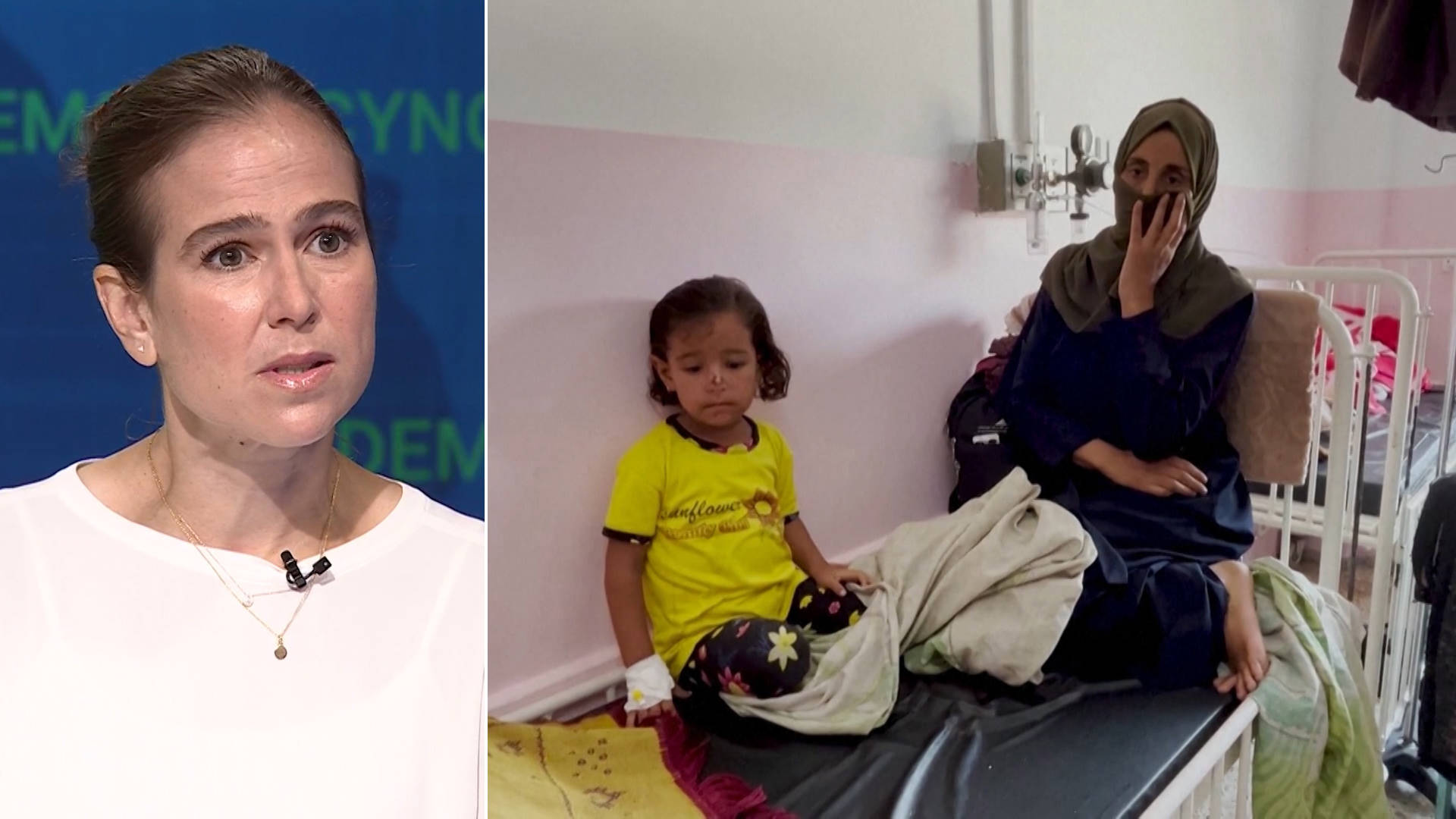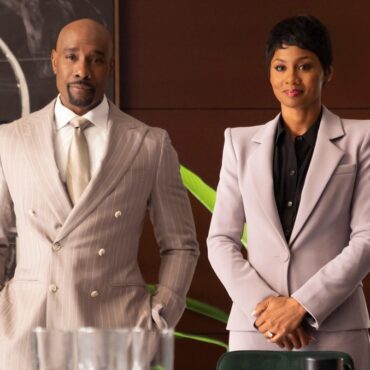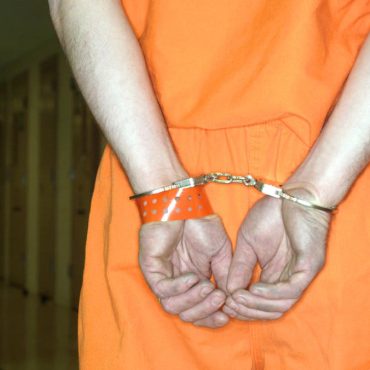This is a rush transcript. Copy may not be in its final form.
NERMEEN SHAIKH: And we’re joined now by Dr. Tanya Haj-Hassan, a pediatric intensive care surgeon who volunteered in Gaza many times. Earlier this week, she spoke at the first-ever panel on Palestinian human rights held at a Democratic convention. “Uncommitted” delegates had asked the DNC to allow Dr. Tanya Haj-Hassan to speak on the main stage, but she’s not been invited.
Dr. Tanya, welcome back to the show. So, if you could just begin by saying, if you had been given the opportunity to speak on the main stage of the Democratic National Convention, what would you have said?
DR. TANYA HAJ–HASSAN: So, I think — you know, I’m an American citizen. Every American physician and surgeon that I know that’s been to Gaza and returned comes back with the same very urgent message. And in fact, when I was first contacted about potentially coming and speaking, I rang the other American doctors and surgeons that I know to see if any of them would be available to join me here in Chicago, and I got an overwhelming response of yes from everybody, with the exception of one person who couldn’t swap out of their shifts. And so, that tells you how much we all feel like we need to deliver this message.
You cannot unsee what you witness there. It is so horrific, so egregious. And we know that it’s being funded by American bombs, and it’s being enabled by American bombs, and in direct contrast to demonstrated realities on the ground, documented realities on the ground, universal condemnation from international human rights and humanitarian organizations, and findings by the ICJ of plausible genocide.
And so, I would have liked to get up on stage and say, look, for the last 10 months, we have witnessed massacre after massacre — massacres of schools where internally displaced people were sheltering, massacres outside of hospitals, massacres of — a flour massacre, water distribution site massacres, humanitarian distribution site massacres. And we have witnessed as our healthcare worker colleagues have been detained, tortured, killed. We have witnessed, as healthcare workers, healthcare workers, journalists and humanitarian workers have been killed at an unprecedented and in record-breaking numbers.
And we feel very much — particularly when we know that international journalists are not let inside of Gaza for the last 10 months, we feel like our witness becomes particularly important. You know, I work for an organization called Médecins Sans Frontières, Doctors Without Borders. And one of our core principles is témoignage, the concept of bearing witness. And that was an organization founded by journalists and doctors, with the understanding that when atrocities are committed anywhere in the world, it’s very important that we bear witness to those atrocities. And that’s particularly important as a physician, when you’re trained not only to treat disease, but to prevent disease and illness. And there’s a very easy way, well within the grasp of the American government, to prevent this disease. But instead, we are enabling it.
AMY GOODMAN: Dr. Tanya, you’re a pediatric intensive care physician, so can you tell us the story of a child in Gaza that stays with you even as you have left?
DR. TANYA HAJ–HASSAN: I mean, it’s hard, Amy. There are so many stories. It’s really heartbreaking. Every single day, I would sit down and try and find five minutes alone to kind of reflect on what happened throughout my day. And this is a practice I’ve always had in medicine. You know, when a patient of mine dies, I take a minute — sometimes I go to the bathroom, sometimes I do it in the patient’s room — just to kind of honor that person. There was no time. There was no time.
You know, I remember — I remember trying to resuscitate two children at the same time, along with my Palestinian colleagues, on a bed, and there were no family members around for either child. They were cousins. And one of their families — the entire family of one of them was killed. Maybe even fortunately for him, he ended up dying, too. And the other one, both of her parents were severely injured in the same attack, and so weren’t at her bedside. And it’s really heartbreaking.
I shared the story the day before yesterday of a child who had lost his parents and all of his siblings, bar one sister who was burned beyond recognition and in the bed next to him while we were treating him. And he kept calling her name, because he didn’t recognize that this body in the bed next to him, burned beyond recognition, was his sister. She died about two days later in the intensive care unit, and he survived, with horrible injuries, but will be — will function well. However, I don’t know how he would ever psychologically survive from that. He told me the following day that he wished he had died. He said, “Everybody I love is in heaven. I don’t want to be here anymore.” And this is the daily reality. This was in March. My colleague, a pain doctor in Gaza, who’s trying to practice pain relief for patients right now, as we speak, without adequate access to pain medications, told me two days ago that children around him are wishing for death.
And, Amy, just importantly, for what’s happening right now outside the DNC, I’m not Palestinian. I know there are a lot of rumors going around that I am Palestinian. I’m not. And, in fact, it would be an honor to be a Palestinian, particularly today, as I watch my Palestinian colleagues come in day after day after day to the hospital, dedicating every ounce of their being to their patients, despite having been displaced five times, having had their own family members killed, knowing that they’re a target of this — a clear target of this military campaign, with over 500 of them killed, some executed, and many detained and tortured. I am not a Palestinian. But I think the fact that people are trying to discredit me by calling me a Palestinian is very telling of how we view the Palestinian voice. You know, Palestinians are humans, are wonderful human beings. And this constant effort to dehumanize is so destructive, not only to the Palestinians themselves, but for the perpetrators of this dehumanization. When you dehumanize others, you dehumanize yourself. And I’m really sad to see that the DNC is a part of this process of dehumanization, of not giving Palestinians a voice where they deserve it.
And I don’t want to be speaking on that platform. I want one of my Palestinian colleagues, and certainly one of the Palestinian delegates would be — but if you’re looking for a medical voice, I would have wanted one of my Palestinians in Gaza to be on that platform, people like Dr. Hammam Alloh, who you interviewed, who said he was not going to leave his patients. He said, “If I leave my patients, who will treat them?” So he didn’t evacuate and was killed. Or people like Dr. Mahmoud, a Doctors Without Borders physician, who stayed at Al-Awda Hospital and wrote on a board, “Whoever stays will tell our story. Remember us.” He was killed. That sign that he wrote was destroyed. This is the reality for healthcare workers in Gaza right now. And they are the ones who should be speaking right now, not me.
AMY GOODMAN: Very quickly, first case of polio, 10-month-old infant in Gaza, the crisis of a disease that was eradicated decades ago there, and how it affects children, and the demand for all the children of Gaza to be inoculated?
DR. TANYA HAJ–HASSAN: Amy, the resurgence of polio is a symptom. It’s a symptom of the bigger disease, and it’s very concerning. It’s a deadly disease. It causes paralysis. Particularly deadly is the paralysis of the breathing muscles, that would require you to be on a ventilator. If that were to happen, there aren’t enough ventilators. There aren’t enough intensive care beds. The majority of the hospitals in Gaza have been destroyed. There are a remaining few partially functioning hospitals. So it would be a death sentence for many people who contract the disease, not to mention the public health disaster of the resurgence of an eradicated, very contagious disease.
But it is a symptom of these unlivable conditions that have been architectured by this military campaign — destruction of sewage systems, destruction of clean water supply, people living in overcrowded conditions, over a thousand people sharing a bathroom or a shower. These are the sort of conditions that are not compatible with life and that are very compatible with the resurgence of these sorts of eradicated diseases. We were already seeing measles, hepatitis, other communicable diseases that you see when people are in crowded circumstances, like they are in Gaza right now.
AMY GOODMAN: Well, we want to thank you for being with us. And for people to hear Dr. Tanya Haj-Hassan’s testimony before the first-ever Palestinian human rights panel held by the Democratic National Convention — it was a side event of the convention itself — you can go to democracynow.org. Dr. Haj-Hassan is a pediatric intensive care physician, served many times in Gaza hospitals, co-founder of the social media account Gaza Medic Voices, which shares firsthand accounts from healthcare professionals in Gaza.
Coming up, we host a roundtable on an issue that’s received very little attention here at the DNC: the climate crisis. We’ll be back in a minute.











Post comments (0)